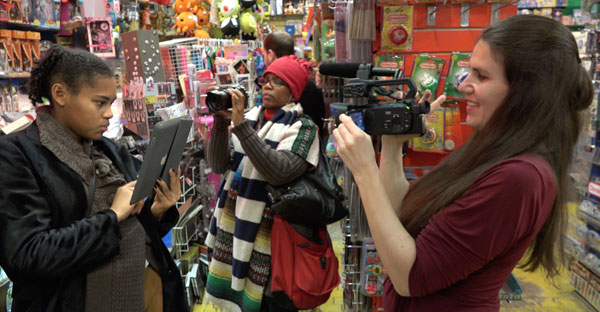Assistant Professor Alexandra Hidalgo has created the first collection of interconnected video essays around one topic. Cámara Retórica: A Feminist Filmmaking Methodology for Rhetoric and Composition is the first video book to be published.
“As far as I can tell, I’m the first person to publish a video book, but there are a lot of people creating video essays,” Hidalgo said. “Video essays are not an entirely new genre, but there’s never been a collection of interrelated video essays that are tied together the way that this one is. There have been isolated video essays, but never a collection of interrelated video essays.”
Comprised of six video essay chapters and published by Computers and Composition Digital Press, Cámara Retórica connects film and video production, feminist filmmaking, and Rhetoric and Composition, drawing from interviews with scholars in Rhetoric and Composition who also practice filmmaking and from women filmmakers discussing their work and creative methods.
“For a video essay, you write your scholarly piece; you record narration; and then you add stills and moving images and music to it,” Hidalgo said. “It’s a blend of reading scholarship and watching a film.”

Cámara Retórica explores feminist filmmaking and how it could benefit those in the field of Rhetoric and Composition who are making moving image work. It defines and develops six principles of feminist filmmaking and applies them to the ways in which Rhetoric and Composition scholars engage with film and video production — from learning the technology, to publishing and screening their work, to attaining traditional and non-traditional modes of recognition for their films and videos.
“If you are going to theorize moving images, it’s not a bad deal to be able to see the images that are being theorized as they’re being theorized,” Hidalgo said. “This way, you get to experience it as you are learning about it, which is one of the strengths of this medium.”
Hidalgo got the idea for a video book from watching the video essay, The Dancing Floor by Sarah Arroyo and Bahareh Alaei, both of whom are interviewed for the video book, describing their creative process for The Dancing Floor.

“It was the first video essay I ever watched and it just floored me,” Hidalgo said. “I decided to create something like the experience of watching The Dancing Floor, but longer. Thus, the video book idea was formed.”
Hidalgo had made video essays before but never something as long as a video book. She worked on the project for five years. First writing her dissertation from where some of the key ideas of the project emerged, then rewriting it into a book for print. She then reenvisioned it as a video book, completed the video process, and finally created a website for it.
Hidalgo received help with the website from then Experience Architecture student Shell Little, who coded and helped design the site.
“I can certainly make films and I can write scholarship, but I can’t code, so there was a level of reaching out to the talent that we have at the university to help me bring this to fruition,” Hidalgo said.

Other help came from then Arts and Humanities and Media and Information student Sarah Shaw, who helped with sound editing, and Professional Writing student Lindsey Spitzley and Rhetoric and Writing Ph.D. student Shewonda Leger, who both helped with cinematography.
Cámara Retórica was published in January. It was featured in #Directed by Women, which brings together the work of feminist filmmakers from around the world.
“Women filmmakers are not as visible as they could and should be,” Hidalgo said. “I hope that after watching the video book, women behind the camera become more natural for people.”

Hidalgo is a filmmaker, teacher, activist, and visionary. The many projects she is involved with help to advance the understanding and practice of feminist filmmaking.
“Feminist filmmaking is, I would argue, of interest to anyone who enjoys watching films and has an interest in how gender and race shape our experiences,” Hidalgo said. “A fair amount of my scholarly work, like Cámara Retórica, theorizes the experience of making films, exploring the ethical dimensions of filming, editing, and screening our own lives and those of others.”
Hidalgo has a Ph.D. in English from Purdue University and an M.F.A. in Creative Writing – Fiction from Naropa University. Cámara Retórica is her first book.


